In the dynamic landscape of business and organizational development, two crucial disciplines, project management and organizational change management, play pivotal roles in driving success and growth. Project management is commonly associated with orchestrating the timely completion of tasks, while organizational change management focuses on guiding individuals and teams through transitions. Recognizing and comprehending the nuanced differences between these two disciplines is essential for thriving in today's ever-evolving corporate world.
Understanding the Distinctions:
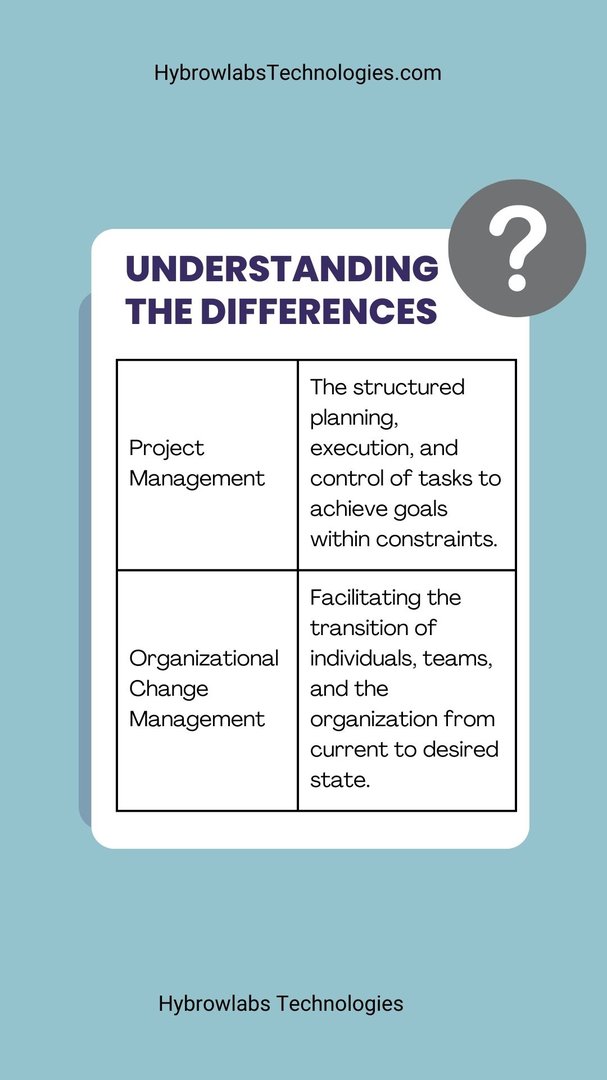
Project management deals with the structured planning, execution, and control of tasks to achieve specific goals within defined constraints.
Organizational change management involves facilitating the process of transitioning individuals, teams, and the entire organization from a current state to a desired future state.
Defining Project Management and Organizational Change Management
Project Management:
At its core, project management revolves around the strategic coordination of resources, tasks, and activities to achieve predetermined objectives. It encompasses a set of methodologies, tools, and techniques aimed at ensuring the successful completion of projects within scope, time, and budget limitations. Project managers are responsible for creating detailed plans, assigning responsibilities, monitoring progress, mitigating risks, and delivering tangible outcomes.
Organizational Change Management:
Organizational change management, on the other hand, addresses the human aspect of transformation within a business environment. It acknowledges that change is not only about implementing new processes, systems, or technologies but also about guiding individuals through the emotional and psychological journey that comes with such changes. Change management professionals work to build a culture of acceptance, manage resistance, and ensure that employees adopt and embrace the changes effectively.
Key Objectives and Goals
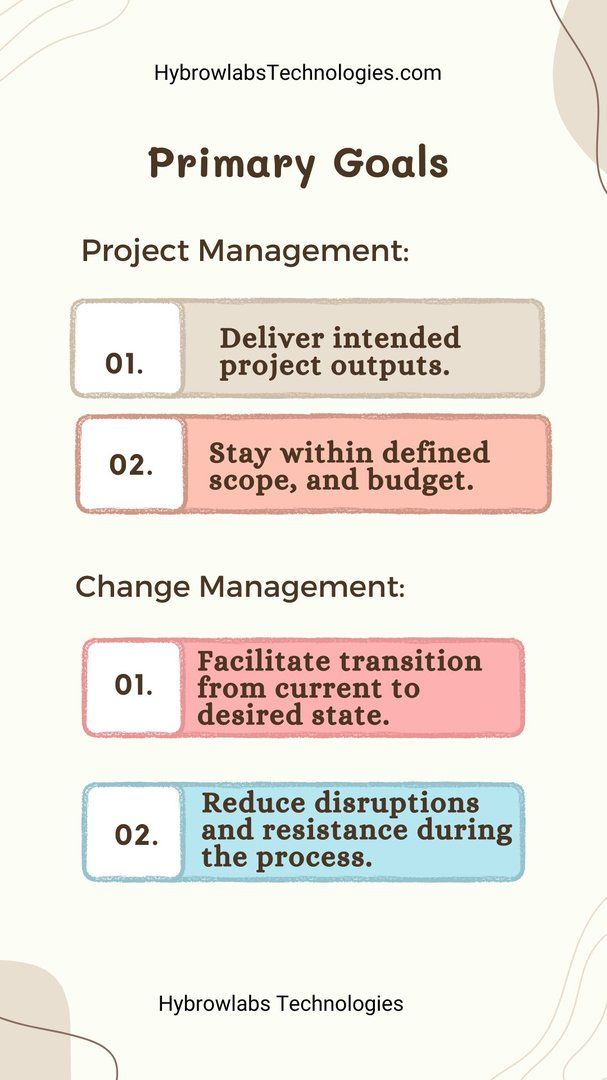
Project Management:
The primary objectives of project management revolve around delivering the project's intended outputs within the defined scope, time frame, and budget. Project managers focus on creating realistic plans, allocating resources efficiently, monitoring progress, and ensuring that the project meets quality standards. The success of a project is often measured by its adherence to these constraints.
Organizational Change Management:
The central goal of organizational change management is to facilitate a smooth transition from the current state to the desired future state while minimizing disruptions and resistance. Change management professionals emphasize open communication, active stakeholder engagement, and the cultivation of a supportive environment to encourage buy-in from employees. Success in change management is gauged by how effectively employees embrace new processes, systems, and behaviors.
In the next sections of this article, we will delve further into the scope, key processes, stakeholder engagement, and the measures of success for both project management and organizational change management. By understanding these aspects, we can gain a comprehensive perspective on the divergent yet interrelated roles that these disciplines play in achieving organizational excellence.
Scope and Timeframe
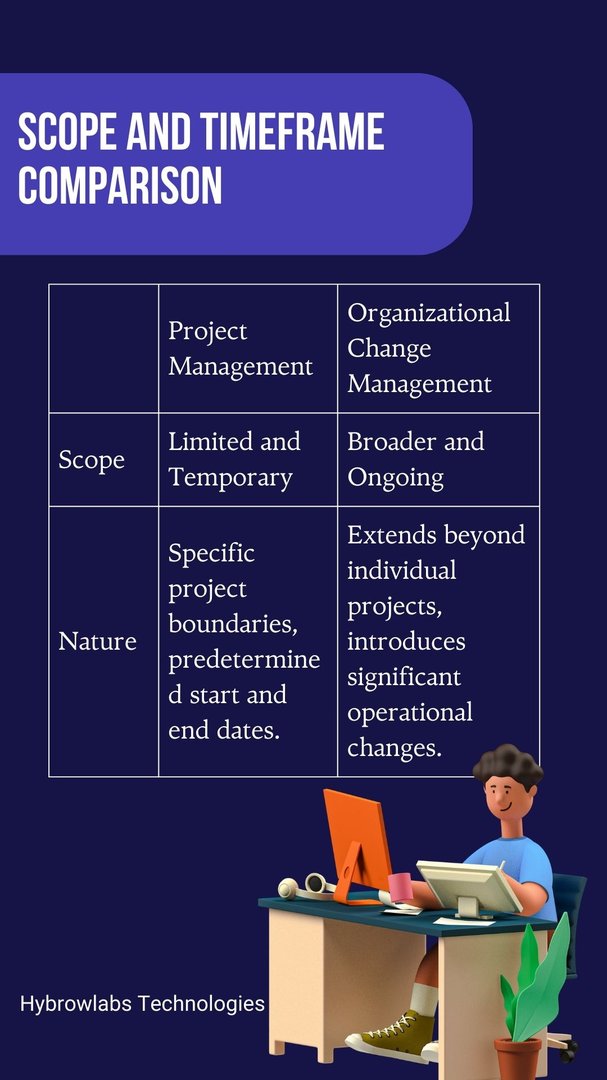
Project Management:
- Limited Scope and Temporary Nature: Project management involves working within specific boundaries, with a predetermined start and end date. It is focused on accomplishing well-defined project objectives, often related to creating new products, services, or outcomes.
- Achieving Project Outcomes: The primary goal of project management is to ensure that the project's scope, time, and budget constraints are met. The project manager's focus is on efficiently delivering the agreed-upon project deliverables.
Organizational Change Management:
- Broader Scope and Ongoing Nature: Organizational change management extends beyond individual projects. It deals with introducing significant changes in how an organization operates, often aligned with its long-term strategic goals.
- Long-Term Sustainability: The core aim of organizational change management is to facilitate lasting change within the organization. This involves fostering a cultural shift, altering processes, and ensuring that the changes become ingrained in the organization's fabric.
Key Processes and Activities
Project Management:
- Planning and Task Allocation: Project management involves detailed planning, including breaking down the project into tasks, assigning responsibilities to team members, and establishing timelines for completion.
- Progress Monitoring and Risk Management: Project managers continuously monitor progress, identifying potential risks and issues that might arise. Corrective actions are taken to keep the project on track.
Organizational Change Management:
- Assessing Readiness: Change managers evaluate the organization's preparedness for change. This includes gauging the willingness of employees to embrace new practices and identifying potential obstacles.
- Communication and Buy-In: Change managers create a comprehensive communication plan to address employee concerns, provide rationale for the change, and encourage buy-in from all levels of the organization.
- Training and Support: To ensure a smooth transition, change managers provide training and support to employees. This helps them acquire the skills and knowledge needed to adopt the new processes effectively.
Role of Stakeholders
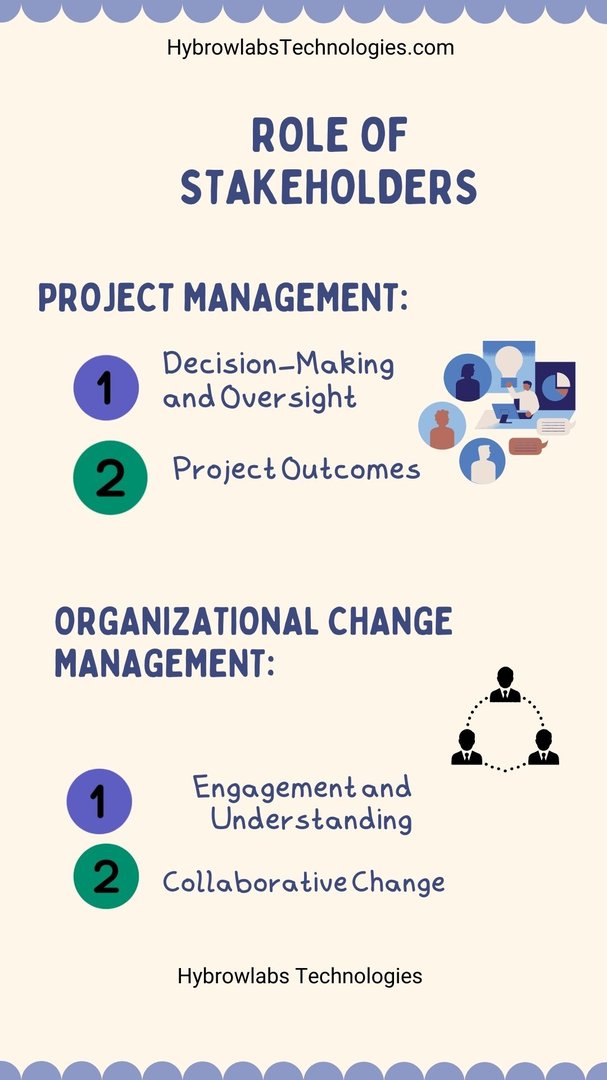
Project Management:
- Decision-Making and Oversight: Stakeholders in project management often participate in decision-making processes and provide oversight to ensure the project aligns with their expectations.
- Project Outcomes: Stakeholders are primarily concerned with the successful completion of the project, meeting predetermined goals, and adhering to set constraints.
Organizational Change Management:
- Engagement and Understanding: In change management, stakeholders are engaged to comprehend their viewpoints, concerns, and potential resistance to change.
- Collaborative Change: Change managers work collaboratively with stakeholders to address resistance, encourage participation, and cultivate a culture that embraces change.
Measures of Success
Project Management:
- Deliverables and Constraints: Success in project management is determined by the successful delivery of project outcomes within the defined scope, time, and budget constraints.
- Meeting Targets: Meeting project-specific targets, such as deadlines and budget limits, is a key indicator of success.
Organizational Change Management:
- Adoption and Utilization: Success in change management is measured by the extent to which new processes or systems are adopted and utilized by employees.
- Employee Engagement and Behavior Change: The successful alteration of employee behavior and sustained engagement in new practices are important measures of success.
Challenges and Pitfalls
- Project Management Challenges: These might include scope creep, budget overruns, and timeline delays.
- Change Management Challenges: Challenges often involve employee resistance, lack of clear communication, and inadequate training.
Examples of Impactful Change Management:
An organization implements a new customer relationship management (CRM) system, but due to insufficient training and communication, employees resist using it, leading to decreased efficiency and frustrated customers.
Examples of Inadequate Change Management Impacting Projects:
A company introduces a new manufacturing process without involving frontline workers, leading to operational bottlenecks and a decrease in product quality.
Conclusion
In conclusion, understanding the distinctions between project management and organizational change management is crucial for achieving successful project outcomes and sustainable organizational transformation. The two disciplines complement each other and should be integrated for optimal results. For more technological knowledge on project management and organization change management, you can visit our hybrowlabs website.
FAQ
1. What is the main difference between project management and organizational change management?
Project management focuses on achieving specific project objectives within defined constraints like scope, time, and budget. Organizational change management deals with facilitating transitions within an organization to ensure lasting adoption of new processes or systems.
2. How does the scope and timeframe differ between project management and organizational change management?
Project management involves a limited scope and temporary nature, with defined start and end dates. Organizational change management has a broader scope and is often ongoing, aligned with long-term strategic goals of the organization.
3. What are the key activities in project management and organizational change management?
Project management activities include planning tasks, assigning responsibilities, monitoring progress, and managing risks. Organizational change management involves assessing readiness for change, creating communication plans, and providing training to support smooth transitions.
4. How do stakeholders' roles vary in project management and organizational change management?
In project management, stakeholders are often involved in decision-making and ensuring project outcomes align with their expectations. In organizational change management, stakeholders' engagement focuses on understanding concerns, addressing resistance, and fostering a culture of change.
5. How are success measures different in project management and organizational change management?
In project management, success is determined by meeting project deliverables within scope, time, and budget. Organizational change management's success is gauged by the adoption and utilization of new processes or systems, along with employee engagement and sustained behavior changes.



4d86d2.jpg)


a3dc85.jpg)
.jpg)
fd8f11.png)

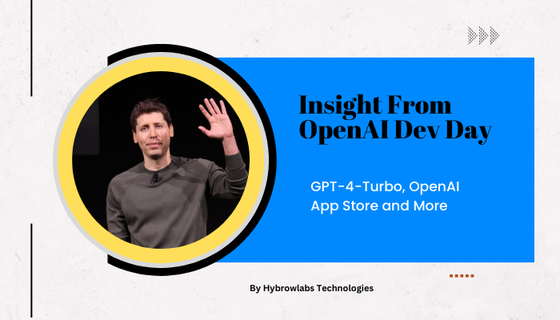
.jpg)
.jpg)